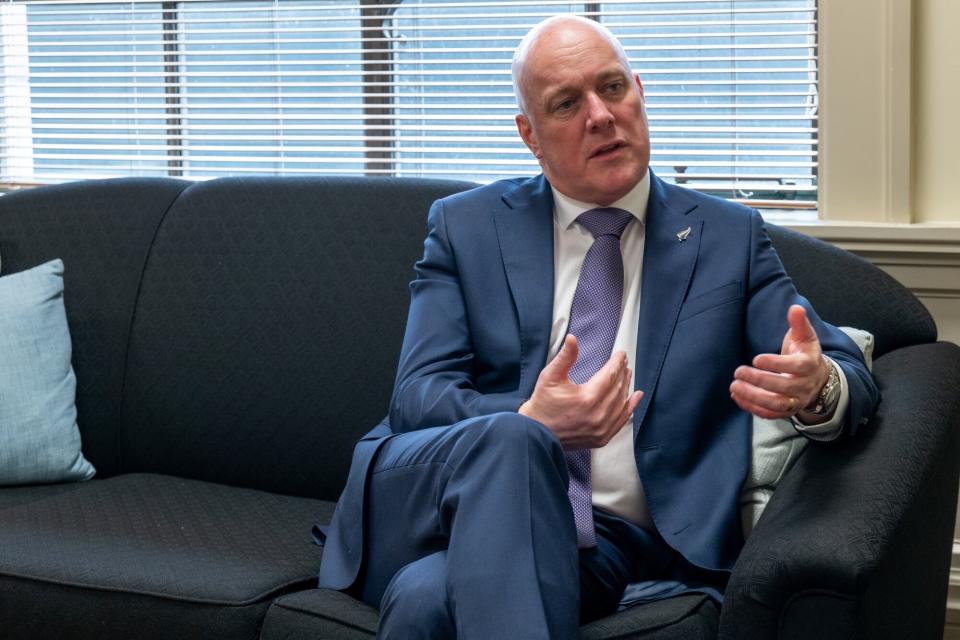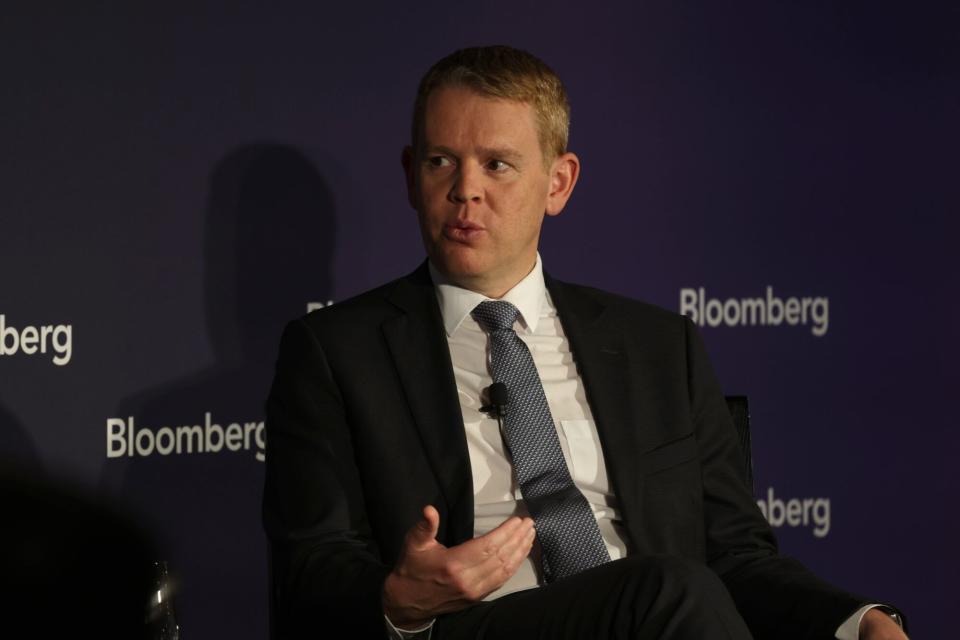Forget Jacinda-Mania, New Zealand Now Has Two Guys Called Chris
- Oops!Something went wrong.Please try again later.
- Oops!Something went wrong.Please try again later.
- Oops!Something went wrong.Please try again later.
(Bloomberg) -- New Zealand’s last two elections were dominated by the star power of Jacinda Ardern. This time around, the nation has to decide between two guys called Chris.
Most Read from Bloomberg
US Probes Made-in-China Chip as Tensions Flare Over Technology
Everything Apple Plans to Show on Sept. 12: iPhone 15, Watches, AirPods
Hong Kong to Ease Shutdown After Record Rain Overwhelms City
Apple’s 2-Day Slide Nears $200 Billion on China IPhone Curbs
With five weeks to go before polling day on Oct. 14, most New Zealanders appear to want someone other than one of the leaders of the two largest parties to be their next prime minister.
Chris Hipkins, leader of the ruling Labour Party, and Christopher Luxon, who heads the main opposition National Party, were both attracting barely 20% support as preferred prime minister in a 1News/Verian poll last month. The majority of respondents want someone else, or are unwilling to express a view.
“No one’s got the star power that Jacinda Ardern had,” said Lara Greaves, associate professor of politics at Victoria University of Wellington. “Politics is returning to normal where there’s not much between the leaders.”
The low ratings are a stark reminder that the 2023 contest lacks a politician like Ardern, Hipkins’ predecessor who rose to power in 2017 on a wave of adulation dubbed “Jacinda-mania.” That was again in evidence in 2020, when she led Labour to a 50% share of the vote at the height of the Covid pandemic, an unprecedented victory under the current electoral system.
National is now in the ascendancy amid a mood for change in New Zealand. To secure a third term in office for Labour, Hipkins will need to win back support during the campaign, which began in earnest this week.
“There’s a lot of undecided voters out there,” Hipkins said in an interview at the Bloomberg Address on Wednesday. “We’re going to be putting forward a positive vision, and we are going to be critiquing the policies put forward by our opponents.”
For his part, Luxon said the fact he’s neck-and-neck with Hipkins in the preferred prime minister rankings is a “great achievement” and “we are very comfortable with where we sit.”
Little in Common
Apart from their first names, the two leaders have little in common.
Hipkins, 45, took over from Ardern after her shock resignation in January. He is a career politician, having served in parliament since 2008, and seen as a safe pair of hands.
Nicknamed “Chippy” — an amalgam of his first initial and surname — he has a down-to-earth demeanor and comes across as genuine, an asset in New Zealand where bombastic-style politics is frowned upon.
Asked about his motivation to be in politics, Hipkins credits his mother, who often told him as a child that it’s easy to see people who have more than you, but not so easy to see those who have less.
“My parents made sure we grew up in a community where we did see people who had less than us every day,” he said. “There are too many New Zealanders who don’t have access to the same opportunities that I had. That’s why I’m in politics, because I think we should change that.”
Read More: Hipkins’ Journey From Police Cell to New Zealand PM
But the year has not been straightforward for Hipkins or his party.
A cost-of-living crisis and high interest rates are slowing the economy, damage from a severe cyclone has added to pressure on the budget deficit, and ill-discipline among ministers has tarnished Labour’s claim to have the stronger team.
National is offering tax cuts, while Labour says the country can’t afford them.
Against this background, Labour’s support dropped below 30% in the 1News poll for the first time since late 2016. By contrast, National has 37% support and could command a majority in parliament alongside its partner, the right-wing ACT Party.
Business Background
National’s recovery from 26% support at the 2020 election can largely be attributed to Luxon, who became the party’s fourth leader in little more than 18 months when he took over in November 2021.
Luxon, 53, only entered parliament at the 2020 election following a successful business career including 18 years at Unilever Plc, where he rose as high as chief executive of the Canadian operation, and then eight years at national airline Air New Zealand, where be became CEO.
Luxon, who has mistakenly used the word “company” when talking about how he would run the country, argues his political inexperience is no disadvantage.
“Coming from outside you have a perspective that’s different than if you’ve been a career politician inside this place,” he said in an interview in his parliamentary office. “The answers actually sit outside.”
But he has struggled to connect with the public and scores poorly in polls on trustworthiness.
Luxon’s Christian faith has also been a topic for commentators. He is pro-life but has said as prime minister he would not change New Zealanders’ rights to abortion.
Luxon has been recorded telling farmers that New Zealand has become a “negative, wet, whiny, inward-looking country” that needs to “get its mojo back.”
He doesn’t resile from that view, saying the nation is very insular and needs to rediscover ambition, aspiration and confidence.
“That’s why I came into politics,” he said. “I really want this country to do well and I think it can do incredibly well in the next 50 years. This election becomes really a defining moment because it will shape things for generations to come.”
The two Chrises will go head-to-head in three televised debates in the run—up to the election, which may have an influence on which one ultimately prevails.
Most Read from Bloomberg Businessweek
Huawei’s Surprise Phone Gives Ammo to Biden Doubters on China
Lyme Disease Has Exploded, and a New Vaccine Is (Almost) Here
©2023 Bloomberg L.P.



